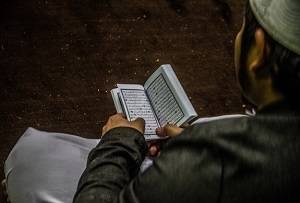As Egyptian Muslims flock to mosques to perform taraweeh, a special nightly prayer only performed during Ramadan, many say they are avoiding prominent mosques for fear of harassment by security forces in a country dogged by political unrest since President Mohamed Morsi was ousted in a 2013 military coup.
“This year I’m going to perform taraweeh prayer at a small mosque beneath my home,” one Morsi supporter, who used to pray at Cairo’s prominent Al-Fath Mosque, told Anadolu Agency on condition of anonymity. “My wife is worried that I could be detained because of my beard.”
Cairo’s Al-Fath Mosque reopened last October after being closed for 14 months following fierce confrontations between security forces and supporters of Morsi.
The iconic mosque was closed in mid-2013 after security forces evicted dozens of pro-Morsi activists and journalists who had been holed up inside after a night of violence outside the building that left more than 200 people dead.
Since Morsi's overthrow, Egyptian authorities have carried out a relentless crackdown on dissent that has mainly targeted the ousted president’s supporters, leaving hundreds dead and thousands behind bars.
Two days before Ramadan began, an Egyptian court sentenced more than 100 people to death – including Morsi himself.
Regulations
Egyptian authorities have recently unveiled new regulations for "itikaf," a Ramadan practice in which worshipers withdraw into a mosque to devote themselves to prayer and reading Quran.
“We have set regulations for worshipers that want to practice itikaf,” Gaber Tayee, undersecretary of Egypt’s Ministry of Religious Endowments, told Anadolu Agency.
According to Tayee, worshipers who want to observe itikaf must first register their names with the authorities.
Under the new regulations, Tayee said, worshipers from outside the area in which the mosque is located will not be allowed to perform itikaf.
PHOTO CAPTION
An Egyptian man reciting Quran
Source: AA


 Home
Home Discover Islam
Discover Islam Quran Recitations
Quran Recitations Lectures
Lectures
 Fatwa
Fatwa Articles
Articles Fiqh
Fiqh E-Books
E-Books Boys & Girls
Boys & Girls  Ramadan
Ramadan Fatwa Audios
Fatwa Audios Month of Mercy
Month of Mercy Women
Women Eed Al- Fitr
Eed Al- Fitr Food Recipes
Food Recipes Videos
Videos

 Prayer Times
Prayer Times












